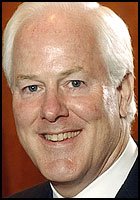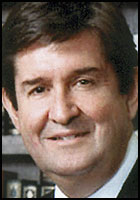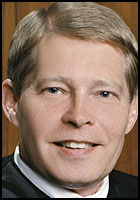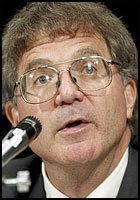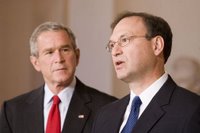"The Unauthorized Disclosure of This Effort Damages Our National Security and Puts Our Citizens At Risk."
America scratches its head and asks: Does the President have the power to circumvent an act of Congress in authorizing a warrantless eavesdropping program which seemingly indiscriminately analyzes the communications of American citizens?
Based on what we know now, the National Security Agency (NSA) was authorized by President Bush to intercept and analyze international communications of US citizens and legal residents without obtaining warrants via the Foreign Intelligence Surveillance Act (FISA) court, established by Congress in 1978. FISA contained exceptions for emergency situations: (1) after Attorney General review, a 72-hour window for warrantless wiretapping is available as long as notice follows and (2) 15 days of warrantless wiretapping is permissible in the event that Congress formally declares war. But the Administration’s only real arguments in defense of the NSA program are (1) Bush may circumvent FISA when it pertains to national security and (2) that the Authorization for Use of Military Force (AUMF) from 2001 implicitly authorizes this expansion of federal surveillance. The second is certainly the hand the administration wants to play with, since it is grounded in actual legislation, not mere opinion. Nevertheless, it seems like a stretch to argue that AUMF implicitly authorizes what FISA explicitly forbids.
America gazes into the mirror, confused, haggard, faintly recalling simpler times. Suppose the President did have the authority to expand the NSA’s surveillance capabilities to capture overseas calls placed by US citizens. Why then was the Department of Justice drafting legislation in 2003 that could authorize this very activity?
The Washington Post reported that:
The Domestic Security Enhancement Act of 2003 -- dubbed ‘Patriot II’ by critics -- was leaked to the media in February 2003 and soon abandoned by Justice officials, who characterized it at the time as an ‘early draft’ written by staff lawyers. The proposal included several provisions that, in retrospect, would have affected the NSA's program of monitoring telephone calls and e-mails…One provision would have made it clear that the president could order wiretapping without court supervision for 15 days after Congress approved the use of military force, as it did against al Qaeda. Current law allows such spying for 15 days without a judge's approval only when Congress issues a declaration of war....Attorney General Alberto R. Gonzales said…the administration had considered seeking legislation authorizing the NSA program but had determined it would be impossible and could expose the highly classified program to the public. Scolinos [DOJ spokewoman] said Gonzales was not referring to the 2003 draft proposals, which she characterized as a compendium of ideas compiled by staff lawyers.Finally, America, delirious, taking a bath, chain-smoking to relieve the stress, wonders: if the program was “narrowly focused, aimed only at international calls and targeted at al Qaeda and related groups” and contained “safeguards…to protect the civil liberties of ordinary Americans,” as the DOJ claimed in a recent press release, why then was this information concealed from all legislators except the congressional intelligence committees’ leadership? The National Security Act of 1947 stipulates that the House and Senate Intelligence Committees must be “kept fully and currently informed” about NSA surveillance activities. As the Progress Report notes, the briefing cannot be restricted to the leadership when the “primary purpose is to acquire intelligence.”
America watches the hearings and reads the DOJ “Myth v. Reality” Press Release which defends the NSA program:
In its Hamdi decision, the Supreme Court ruled that the AUMF also authorizes the ‘fundamental incident(s) of waging war.’ The history of warfare makes clear that electronic surveillance of the enemy is a fundamental incident to the use of military force.We have listened to the enemy…and it is patching things up with its girlfriend.


 On Thursday night, ACS founder and Georgetown law professor Peter Rubin visited Columbia and spoke on what the nomination of Judge Alito and, in a larger sense, the changing jurisprudence of the Supreme Court means to the nation. Rubin addressed the dangers inherent in a narrow reading of constitutional provisions--especially those that protect individual rights--and placed the fate of Roe v. Wade in a larger context that considers the role that human values play in the law.
On Thursday night, ACS founder and Georgetown law professor Peter Rubin visited Columbia and spoke on what the nomination of Judge Alito and, in a larger sense, the changing jurisprudence of the Supreme Court means to the nation. Rubin addressed the dangers inherent in a narrow reading of constitutional provisions--especially those that protect individual rights--and placed the fate of Roe v. Wade in a larger context that considers the role that human values play in the law.

